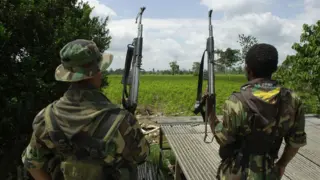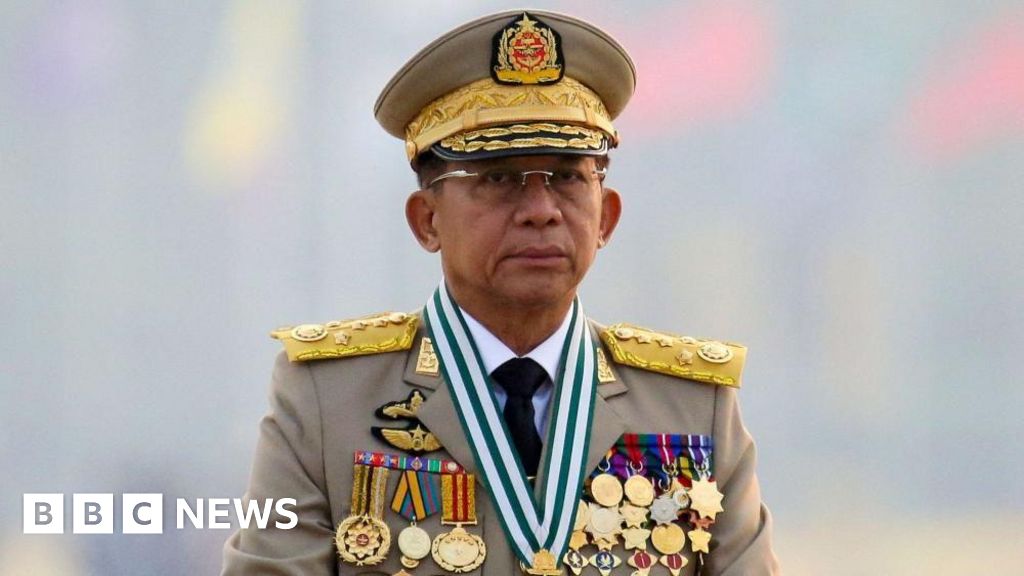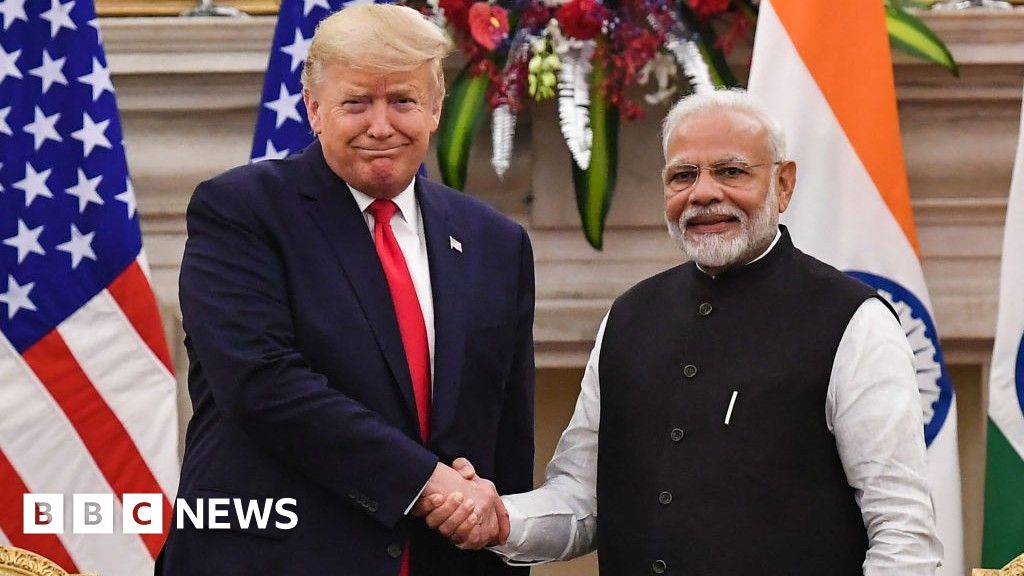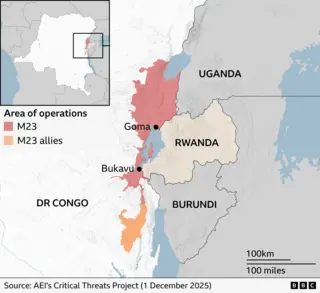José Carlos CuetoBBC News Mundo Colombia correspondent
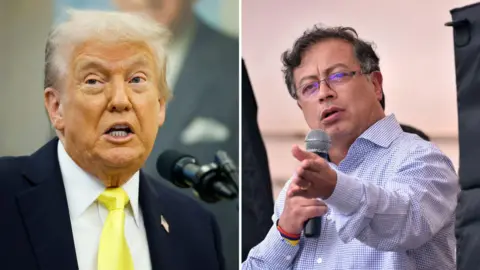 Getty Images
Getty ImagesFor decades it was one of Washington’s closest alliances.
United in their fight against drug trafficking, Colombia and the United States co-operated closely, with the latter receiving hundreds of millions of dollars in US military assistance annually.
But now that alliance appears be more fragile than ever.
The leaders of the two countries may have a similar style – forceful and not prone to mincing their words – but left-wing Gustavo Petro and Donald Trump come from opposing ends of the political spectrum and have clashed frequently since Trump returned to the White House in January.
On Sunday, tensions reached their highest point when Trump accused Petro of encouraging drug production in Colombia and announced the suspension of payments and subsidies to the South American country.
This came after Petro had in turn accused US officials of murdering a Colombian citizen and violating his country’s sovereignty in one of the multiple strikes that the US military has carried out against alleged drug vessels in the Caribbean since early September.
BBC Mundo spoke to experts who warned that with the alliance in jeopardy, both Colombia and the US could be at risk of losing out while organised crime groups look set to benefit.
Roots of the US-Colombia alliance
Colombia became one of the main beneficiaries of US aid in the early 2000s, with the money going towards “Plan Colombia” – a US-funded initiative to combat drug trafficking groups, reduce the flow of drugs to the US, and strengthen the Colombian security forces.
This investment is credited with weakening the Farc guerrilla group, which was at war with the state before officially demobilising in 2016.
Since then, US assistance has been reduced – and has coming under questioning.
Despite Colombia’s military successes against armed groups, and its recent years of relative stability and security, some analysts doubt whether Plan Colombia truly resolved the drug problem in the long term.
Cocaine production is currently at record-high levels in Colombia, according to researcher Héctor Galeano from the Colombia-based Institute of Advanced Social and Cultural Studies of Latin America and the Caribbean.
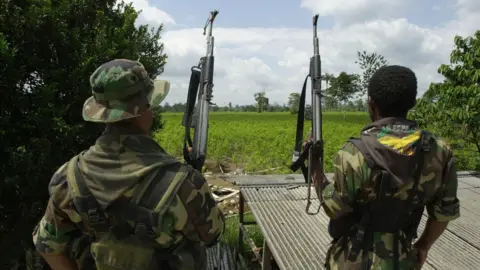 Piero Pomponi/Newsmakers
Piero Pomponi/NewsmakersThe level of cultivation of coca, the key ingredient in cocaine, is also at record highs, although the Colombian government maintains that the rate of crop expansion has been slowing since 2021.
The US military campaign in the Caribbean to combat drug trafficking paradoxically demonstrates that drugs have not been eradicated in the region and remain a priority for Washington.
The strengthening of the security forces under Plan Colombia also had collateral effects.
Paramilitary groups became involved in abuses against civilians, and some demobilised members of these groups later joined the drug-trafficking business.
Similarly, the high number of military personnel in the early 2000s produced a large pool of young, retired soldiers, some of whom have been accused of signing up as mercenaries to fight in foreign conflicts.
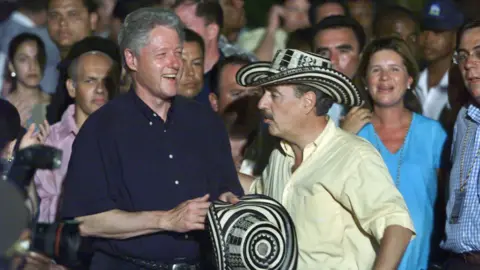 Getty Images
Getty ImagesDespite the reduction in funding in previous years, US aid to Colombia still exceeded $400m (£300m) in 2024, according to estimates by the US-based research organisation Washington Office on Latin America (Wola).
Elizabeth Dickinson, an analyst with the International Crisis Group, told BBC Mundo that Colombia remained “by far, the closest US partner in the fight against narcotics in all of Latin America”.
“It’s been almost three decades of US investment, training, and an unprecedented level of coordination,” Ms Dickinson said.
The alliance has made Colombia and the US reliant on each other in terms of security. Today, thanks in part to US aid, Colombia has one of the most powerful militaries in Latin America.
In turn, Washington relies heavily on Bogotá for its counter-narcotics operations, Ms Dickinson explains.
“About 80% of the intelligence the US uses to intercept drugs in the Caribbean comes from Colombia.”
Eroding support
Military aid is not the only funding Colombia has received from the US in recent decades.
With the help of USAID – Washington’s foreign policy and development aid agency – Colombia launched several peace and growth projects, especially in poor and conflict-ridden areas.
But earlier this year, the Trump administration announced the de facto dismantling of the agency.
Colombia, USAID’s largest beneficiary in the region, saw many of its initiatives cancelled and dozens of jobs lost.
“The other sources of aid come from the State Department in the form of civilian and defense funding,” Ms Dickinson explains.
She says that the assistance that exists today – which Trump appeared to refer to in his announcement of cuts – funds communications, intelligence, and equipment capabilities in Colombia, such as helicopters.
“But beyond these funding issues, the seizure, capture, and high-value operations that Colombia carries out are frequently co-ordinated with the United States,” she continues.
“Not only is economic aid lost, but also the institutional relationship between the two countries combating a shared threat.”
In mid-September, the US for the first time in 30 years, officially named Colombia as a country which it said had “demonstrably failed” to uphold its obligations to control drug trafficking – thereby opening the door to a funding cut.
However, at the time Washington stopped shot of cutting the aid flow, leaving the move as a warning.
But just a month later, the feared cuts appear to be materialising.
Inconvenient timing
The latest rift between Trump and Petro comes at perhaps the most inconvenient time possible for both administrations.
Petro is fighting to bring “total peace” to Colombia, a campaign promise he made which this year appears to be collapsing with attacks by armed groups mounting in regions such as Catatumbo, Cauca, and Valle del Cauca, and culminating in the assassination of presidential candidate Miguel Uribe Turbay in Bogotá.
Trump, meanwhile, is waging a controversial campaign against drug traffickers, and since September, US military vessels have attacked suspected drug boats, killing at least 37 people – 32 in strikes carried out in the Caribbean and five more in the first such US attacks on two vessels in the Pacific, carried out on Wednesday.
This campaign has mainly been aimed at vessels alleged to have come from Venezuela, whose president, Nicolás Maduro, Trump accuses of being the leader of the Cartel of the Suns drug gang.
Maduro has vehemently denied the accusation and said the strikes are aimed at ousting him from office.
The legality of the operations has also been questioned by legal experts who warn that they breach international law.
One of the most outspoken critics of the US strikes has been President Petro, who has called on the United Nations to open a “criminal process” against Trump for the strikes.
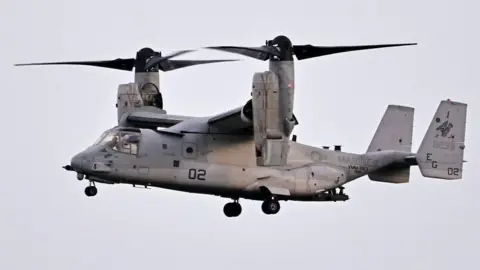 Getty Images
Getty ImagesNevertheless, both governments appear to need each other, although, in light of the recent tensions, they are also moving towards disengaging from each other.
Mr Galeano says that given their opposing views and outspoken style it was clear that relations between Petro and Trump were “going to explode at any moment, especially after the US bombings of the boats in the Caribbean”.
In September, Petro told BBC News that Trump’s attacks on boats were an “act of tyranny” and called for US officials to be prosecuted for “murder”.
Last Saturday, he echoed a report published by state-run media outlet RTVC alleging that a Colombian fisherman named Alejandro Carranza had been killed in a US strike on a boat on 16 September.
Hours later, Trump announced the suspension of aid and warned that if Petro did not stamp out drug production in Colombia, the US would do it for him “and it won’t be done nicely”.
According to the Colombian Foreign Ministry, this constituted a threat “to conduct an illegal intervention in Colombian territory”.
‘Devastating blow’
Ms Dickinson describes the deterioration in US-Colombian relations and the cuts in aid as “a devastating blow” and warns that they are likely to “weaken the ability of security forces to control armed groups”.
She adds that it is “difficult to understand” why the US would take such a decision at a time when tensions are high in the region due to the US deployment in the Caribbean and Trump’s declaration of an “armed conflict” with drug trafficking groups.
“Why confront your closest ally when regional security is already at stake?” Ms Dickinson asks.
Mr Galeano also thinks that cracks in the once strong US-Colombian alliance carry risks for both countries.
“Colombia needs the US, and the US needs Colombia. There are military bases that the US uses in Colombia, with agreements even signed during Petro’s administration,” he explains.
“In all of this, the criminal gangs win.”
“While Trump focusses on the Caribbean, traffickers smuggle drugs through the Pacific, from Ecuador and Colombia, which are reportedly the source of most narcotics shipped out of South America,” the expert adds.
Since Trump returned to the US presidency in January, the friction between his and Petro’s governments has barely let up.
Within days, the two countries came close to a trade war after Petro turned back a flight carrying Colombian deportees from the US, denouncing the conditions in which they were traveling.
The trade war was quickly averted after some frantic negotiations, but the crisis set the tone of things to come.
Read: Co-operate or else: Trump’s Colombia face-off is warning to all leaders
When Colombian presidential candidate and opposition leader Miguel Uribe Turbay was shot dead in Bogotá in early June, US Secretary of State Marco Rubio linked his assassination to “violent leftist rhetoric coming from the highest levels of the Colombian government”.
Weeks later, both governments recalled their ambassadors for consultations, a move often interpreted in international relations as preceding the breaking off of bilateral relations.
The envoys remained in place, but Washington has since dealt further severe blows to the Petro government.
Not only did it formally decertify Colombia as a partner in the war on drugs, but it also revoked Petro’s visa after he led a pro-Palestinian protest in New York during his visit there for the United Nations General Assembly.
Following the suspension of US aid and amid the continuing tense antagonism between Petro and Trump many fear that relationship could deteriorate even further.
